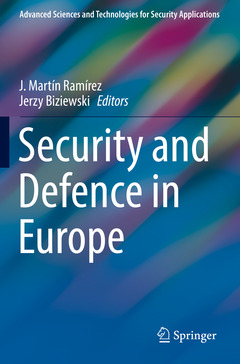Security and Defence in Europe, 1st ed. 2020 Advanced Sciences and Technologies for Security Applications Series
Coordonnateurs : Ramírez J. Martín, Biziewski Jerzy

This book argues that security and defense have never been true priorities in the European Union, and have constantly been marginalized by the elites since the Soviet Union collapsed and the Warsaw Pact disintegrated. Despite the official rhetoric, only a few tangible results can be presented concerning the operational readiness of European forces, and the EU?s inability to act was proven during the crises in the Balkans, NATO has experienced similar problems, as the majority of its members are EU countries. Both organizations have declared their resolve concerning the security and defense of their nations and territories, but, unfortunately, little has been done to lend these statements credence.
In this context, the book analyzes several aspects of EU security and defense, including: the EU ? NATO relationship, common defense policy and strategy, common capability building, common understanding of strategic changes, common operational planning and centrally synchronized exercises based on operational planning, etc. The member states have helped to make EU/NATO effective organizations, but unfortunately their individual interests and priorities constitute real challenges. This aspect should be discussed and addressed by political and military elites, scholars, analysts, students and the general public alike.
Prologue.- Introduction.- Part I: Security Issues.- Social science and security culture’s three streams of energy.- The EU defence against a new type of threat: corruption.- European cybersecurity: future challenges from a human rights perspective.- The refugees issue in the frame of European security: a realistic approach.- The meta-tragedy of the Commons. Climate change and the securitization of the Arctic Region.- Part II: Defence aspects of European Union.- From the European Defence Community to the Permanent Structured Cooperation.- The Permanent Structured Cooperation: its true potential value.- Untangling the separate concepts of security and defence in the context of BREXIT.- Why nations fail?.- European Union vis-a-vis Non-Proliferation Treaty, Comprehensive Nuclear-Test-Ban Treaty and Nuclear Weapon Ban Treaty.- Part III: Outer Borders of Europe.- Northern Flank considerations.- How can Europe cope with challenges at its Southern flank?.- Maritime dimension in the fight against illegal migration: the Southern Europe Western route.- Eastern Flank of EU and NATO – challenge and opportunity.- Part IV: NATO.- Russia’s A2/AD policy as a balancing strategy versus NATO enlargements.- NATO-UE cooperation: milestones and challenges.- EU-NATO relations.- Rough times ahead for NATO.- Epilogue.
1) J. Martín Ramírez is Chair of the Center for Conflict Studies at Universidad Nebrija and of CICA International and of the Spanish Pugwash Movement (Peace Nobel Price 1995). He studied Medicine, Humanities, and Law, obtaining a PhD degree in Medicine and Surgery (Neurosciences) and in Philosophy (Education) as well as three Diplomas and a Master in National Defense at the Spanish CESEDEN. Humboldt & Fullbright Fellow, in Ruhr Universität and Stanford, respectively, Dr. Martín Ramírez is also Research Fellow of International Security Program of the Harvard University and Visiting Fellow of the Hoover Institution on War, Revolution and Peace, Stanford University, probably the most important left-leaned and right-leaned American think-tanks, respectively. He also served as Visiting Professor and Research Fellow at universities in Israel, France, Poland, Wales, Australia, Japan, Canada, Iran, Guatemala, Germany, and the USA. Dr. Martín Ramírez has been awarded multipleinternational honors, such as being several times official of the Boarding Counsel of the International Society for Research on Aggression (ISRA), on the Advisory Board of the Society for Terrorism Research and of the Professors World Peace Academy, and Fellow of the World Academy of Art and Sciences and of the New York Academy of Sciences, as well as a Professional Award on Aggression and Inter-ethnic Conflicts by the East-West Center, established by the United States Congress, among others. Dr. Martín Ramírez is author of about 500 scientific publications, among books and articles, in more than ten languages. He has also been Head of the Complutense Research Group on Sociopsychobiology of Aggression, Head of the Departments of Psychobiology at Seville and Complutense Universities, and Director of the Cabinet of the Rector at the Madrid Autonomous University.
Major General (Ret.) Jerzy Biziewski performed last duties as the Head of Plans Directorate, NATO SHAPE/Allied Command
Date de parution : 08-2020
Ouvrage de 264 p.
15.5x23.5 cm
Date de parution : 06-2019
Ouvrage de 264 p.
15.5x23.5 cm



